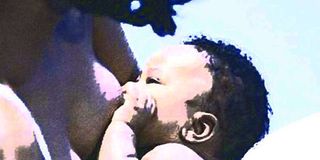Pain of breastfeeding during Covid-19

What you need to know:
- She was separated from her 17-month-old daughter whom she was still breastfeeding, when she was rushed into isolation at Nakuru Level Five Hospital.
- When she returned home, her daughter would not even recognise her despite the many attempts to entice her; she refused to breastfeed.
Juliet (identity protected) has gone through 11 days of torture.
“Every single day I spent in isolation, I cried my all and called out to God to see me through the pain,” confesses Juliet.
She was separated from her 17-month-old daughter whom she was still breastfeeding, when she was rushed into isolation at Nakuru Level Five Hospital.
From June 28, when she was checked in to July 9 when she was discharged, Juliet says she never slept as the pain in her engorged breasts kept her awake all night.
“I thought about my daughter every second I spent in the isolation room and wished she was there to breastfeed,” says Juliet, a waitress at a Nakuru restaurant.
RECOGNISE HER
“I had to request for some medicine to relieve the pain,” adds the mother of three.
When she returned home, her daughter would not even recognise her despite the many attempts to entice her.
Her daughter’s refusal to breastfeed again, however, broke her heart the most.
Juliet’s plan was to breastfeed her third born for two years and six months to strengthen her immunity and keep her healthy.
The sickly nature of her second born, whom she stopped breastfeeding at one-and -a-half years, had taught her a lesson to prolong the breastfeeding.
COW'S MILK
“I stopped breastfeeding my second born too soon and I regretted. He has been a weak child and I did not want that to happen to my daughter,” she says.
To compensate for the mother’s milk, Juliet says she is now feeding her with plenty of cow’s milk and fruits.
“But I know that cannot be equated to breast milk. It worries me very much that her immunity would be weakened since she did not breastfeed enough,” she says.
Juliet was one of the two hotel workers whose results for Covid-19 turned positive and on the fateful Sunday, they were rushed to the isolation unit.
After four days, she was tested again and it turned out she was negative.
EMERGENCIES
She wishes, she had been isolated with her daughter as the separation caused her psychological trauma that she says, she is yet to get over.
“My plea to the government officials handling Covid-19 emergencies is to never separate a breastfeeding mother from her child. Let them be together in isolation. In case she is positive, then the child is obviously exposed since they have been together,” she states.
“The separation is the most painful thing to do to the mother and the child. I suffered in the most painful way I can never explain.”
Juliet’s plea draws attention to the need for gender-responsive strategies in combating Covid-19, which various local and international organisations including UN Women and United Nations Children’s Fund (Unicef) have repeatedly urged nations across the world to adopt.
August 1 to 7 was the World Breastfeeding Week and this year’s theme is ‘Support breastfeeding for a healthier planet’.
IMMUNE SYSTEM
In this regard, World Health Organisation (WHO) and Unicef appealed to “governments to protect and promote women’s access to skilled breastfeeding counselling, a critical component of breastfeeding support.”
A study Breastfeeding, the Immune Response, and Long-term Health published in the he Journal of the American Osteopathic Association, indicates that breastfeeding provides unsurpassed natural nutrition to the new-born and infant.
“If immune system development is significantly improved with the introduction of components of breast milk, then prematurely discontinued breastfeeding may facilitate pathogenesis of many chronic diseases later in life (e.g. autoimmune disorders),” reads a section of the study.





